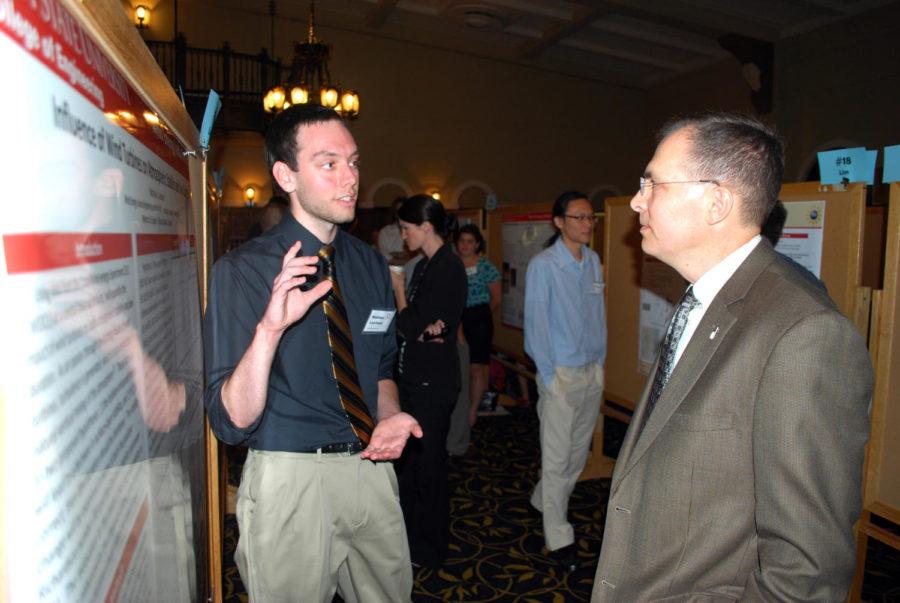$20 million grant kickstarts project to fund competitive energy research
Photo courtesy of Robert Mills
Matthew Lauridsen, senior in meteorology, explains his research on wind turbines to Ted Heindel, project director of Iowa NSF EPSCoR, during the Iowa EPSCoR annual meeting on July 31, 2012, in Iowa City, Iowa.
February 11, 2013
A five-year, $20 million grant from the National Science Foundation has allowed researchers from all three Regent universities to collaborate in an effort to make Iowa more competitive in renewable energy and energy utilization efforts.
The National Science Foundation’s project, known as the Experimental Program to Stimulate Competitive Research, is commonly referred to as EPSCoR.
The program was recently awarded $2 million to help pay for research equipment by the Iowa Power Fund, according to the University of Iowa College of Engineering website.
Theodore Heindel, professor in mechanical engineering, is also the director of the overall NSF EPSCoR project as well as the leader of the Energy Utilization platform within the project.
“The project involves all three Regent institutions and is reaching out to several community colleges,” Heindel said. “The exact title of the project is ‘Harnessing Energy in the Biosphere to Build Sustainable Energy Systems’ and focuses on renewable energy and energy utilization. The project is poised to make Iowa a leader in renewable energy and energy utilization.”
Heindel became involved with the project in April 2012 when he was asked to lead one of its platforms, the Energy Utilization Platform.
Heindel said he was asked because of his background in energy systems. He took over as project director this past January.
Heindel said that there are many tasks underway related to the overall NSF EPSCoR project.
“Some are related to research activities, like increasing the number of funded proposals and publications in renewable energy areas,” Heindel said. “Some are related to outreach and workforce development, like increasing the number of underrepresented groups in energy-related fields of study and providing more research opportunities in energy-related areas.”
Currently, the project is working with the grant from the National Science Foundation to make Iowa more progressive with renewable energy, Heindel said. He said that it is a very broad project, involving many researchers from all three Regents universities.
“For example, researchers at Iowa State and the University of Iowa are working with a wind farm owner to better understand the best way to harness energy from the wind,” Heindel said. “Iowa State and University of Iowa researchers are also working to improve energy crops for biofuels.”
Heindel went on to add that other researchers at Iowa State, Northern Iowa and the University of Iowa are working to understand energy saving activities in the home and how to best encourage the public to change behavior that will help to decrease their energy footprint.
Iowa State is also working to educate lawmakers about energy policy implications.
According to the Iowa EPSCoR website, Iowa is a leading competitor in renewable energy resources.
“Despite ranking 26th in land area, it is first in the nation in ethanol fuel production and fourth in wind power generation,” according to the website.
The website also said that the transition from fossil fuels to bioenergy and wind energy is not without challenges. This is where EPSCoR comes in.
To help combat these challenges, the project is composed of four different platforms: bioenergy, wind energy, energy utilization/energy efficiency and energy policy.
Heindel is in charge of the energy utilization/energy efficiency platform.
Heindel said the project has had its challenges in getting started, but the project is beginning to hit its stride.
“We are into our second year of this five-year project, and we are starting to hit our stride in terms of research and outreach activities,” Heindel said. “There will be many more successes that will be reported in the future, so I encourage [people] to stay tuned.”
Heindel said the biggest challenge has been with starting up the project and getting it to hit the stride it is at now.
“The biggest challenge with getting the NSF EPSCoR project up and running has been getting the staffing in place and figuring out how to work together with all three Regent universities,” Heindel said. “We now have this in place and are moving forward on the specific project goals and objectives.”







